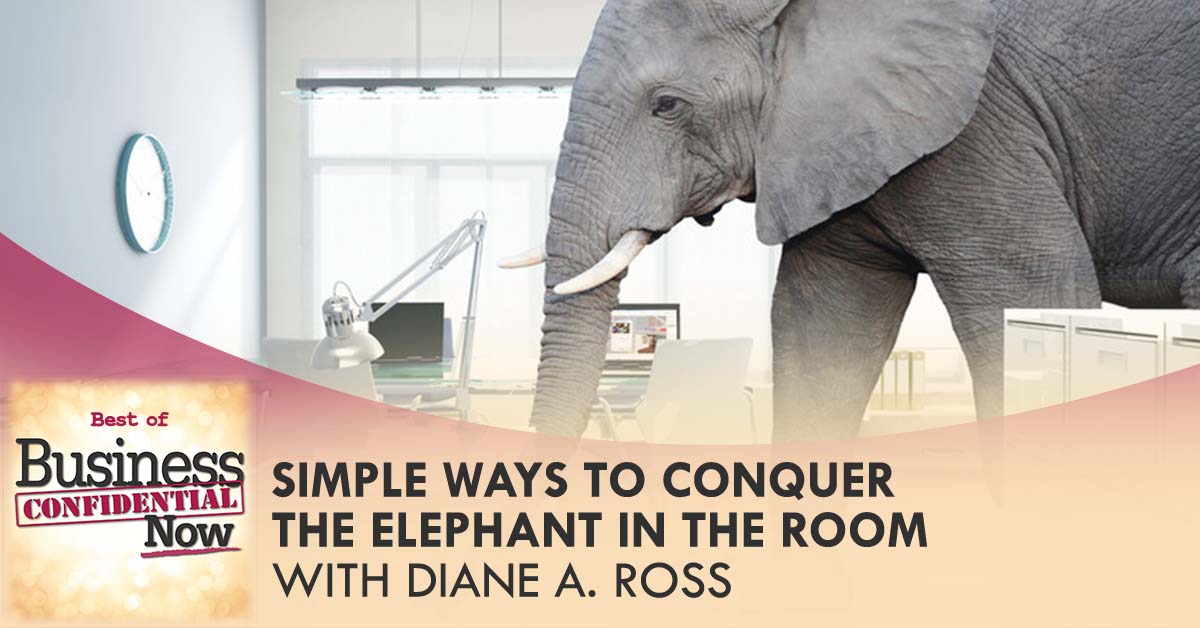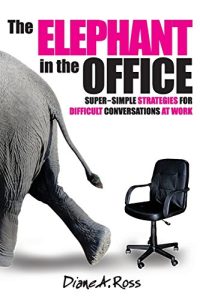
Photo Credit: © Can Stock Photo | tiero
Everyone has encountered the elephant in the room, that obvious problem or risk that nobody wants to talk about. It creates awkward situations and sometimes paralysis. Join host Hanna Hasl-Kelchner as she welcomes communications expert Diane A. Ross, who has a solution for how to conquer the beast and restore harmony and productivity to your business.
—
WHAT YOU’LL DISCOVER ABOUT THE ELEPHANT IN THE ROOM:
- The most important question you need to ask yourself about the elephant in the room.
- The message you send when you don’t address the elephant in the room.
- What to do when the elephant in the room is embedded in the business culture.
- The biggest drawback of waiting too long to address the elephant in the room.
- Sample conversations for addressing chronic lateness, jokes that aren’t funny, and interrupters.
- 3 essential keys to preparing for a successful conversation.
- And much MORE.
—
GUEST
 Diane A. Ross teaches entrepreneurs and professionals how to tackle difficult conversations fearlessly. After a 14-year career as a litigation lawyer, she learned that the guns-blazing communication style that won cases in the court was damaging the relationships in the rest of her life. That realization led her on a 10-year journey to uncover the secrets of effective communication in times of conflict.
Diane A. Ross teaches entrepreneurs and professionals how to tackle difficult conversations fearlessly. After a 14-year career as a litigation lawyer, she learned that the guns-blazing communication style that won cases in the court was damaging the relationships in the rest of her life. That realization led her on a 10-year journey to uncover the secrets of effective communication in times of conflict.
She brought her lawyer’s zealousness to the process and devoured the research on the topic, trained in Advanced Negotiation and Mediation at Harvard Law School, became a Certified Executive Coach and, in 2012, started Elephant Conversations to bring her system for tackling difficult conversations to the world because she believes that each one of us could be one conversation away from having ANYTHING WE WANT.
An accomplished and sought after speaker, Diane was a 2013 semi-finalist for North America’s Next Greatest Speaker Competition hosted by the prestigious eWomen Network and is the author of The Elephant in the Office: Super-Simple Strategies for Difficult Conversations at Work (Elephant Conversations) (Volume 1). Today, Diane brings her easy-to-implement tips and strategies to hundreds of people and organizations through webinars and speaking events.
—
RELATED RESOURCES:
Contact Diane and connect with her on LinkedIn, Facebook, Twitter, and YouTube.
—
SUBSCRIBE, RATE AND REVIEW:
Subscribing is easy and lets you have instant access to the latest tactics, strategies and tips.
Become a Preferred Listener or subscribe to the show through your favorite podcast feed.
Rating and reviewing the show helps us grow our audience and allows us to bring you more of the information you need to succeed from our high-powered guests.
Download ♥ Subscribe ♥ Listen ♥ Learn ♥ Share ♥ Review ♥ Enjoy
—
Simple Ways To Conquer The Elephant In The Room With Diane A. Ross
When there’s an elephant in the room, it’s that big topic, that obvious problem or risk that nobody wants to talk about? My next guest has a solution. She’s a communications expert, Diane A Ross.
—
Diane A Ross teaches entrepreneurs and professionals how to tackle difficult conversations fearlessly. After a fourteen-year career as a litigation lawyer, she learned that our guns are blazing communication styles and that one case in the courtroom was damaging in relationships for the rest of her life. That realization led her on a ten-year journey to uncover the secrets of effective communication in times of conflict. She brought her lawyers’ zealousness to the process and devoured the research on the topic.
She trained in the Advanced Negotiation and Mediation at Harvard Law School and became a certified executive coach. In 2012, she started Elephant Conversations to bring her system for tackling difficult conversations to the world, knowing that each one of us could be one conversation away from having anything we want. She’s an accomplished and sought-after speaker.
Diane was a 2013 semi-finalist for North America’s Next Greatest Speaker competition hosted by eWomenNetwork. She’s the author of The Elephant in the Office: Super-Simple Strategies for Difficult Conversations at Work. It is something we can all use. Diane brings her easy-to-implement tips and strategies to hundreds of people and organizations through webinars and speaking events. That’s why I’m so jazzed to have her here to join us. Welcome to the show, Diane.
Thank you so much. I’m excited to be here.
I’m glad to have you because I love the metaphor of the elephant in the room. We have all been in situations where there’s an obvious problem at the office that people are afraid to talk about. In your experience, what are we afraid of that keeps us from moving forward?
There are a couple of things. The biggest thing is we are fearful that if we bring it up, then we are going to make things worse that somehow, “If I bring up this topic, that person might get upset, react or maybe they will give me the cold shoulder.” It’s going to make things worse. We tell ourselves this story and then convince ourselves it’s not worth saying anything. That’s one of the big reasons.
In some ways, saying nothing just feeds the elephant and makes the problem bigger, though, doesn’t it?
When we think about the goal, it's going to help us to stay on track. Share on XThat’s the thing, sometimes, when people get into these situations, they don’t take that into consideration. If you have, say, a colleague, for example, who consistently comes to your team meetings late, and everybody is waiting, resentment is starting to build, people are getting frustrated, and nobody says anything. Nobody holds that person accountable and wants to know about the impact. That’s sending the message that that’s okay to come late. The chances are that person will continue to do it. What we forget is that we don’t say anything. We are sending the message, number one, that everything is okay. There’s not a problem.
What happens is it builds and builds in resentment. Finally, it ended up because it comes in late for the tenth time, and you blew out some unpleasant comment. We are the ones who end up looking foolish because we are overreacted in that particular situation. We don’t think about the cost of not saying anything, and we are sending the message that it’s okay.
If somebody speaks to us in a way that we experience some disrespectful or maybe they tell jokes but we don’t find them funny or are not stepping up and doing their share of the work, and we don’t say anything, we are sending the message that it’s okay. We are going to get more of that behavior. We forget about that. The other thing that happens is that problems get bigger.
They don’t get smaller like elephants get bigger as time goes on, and the problem becomes something that started, “If I dealt with this when the problem first occurred. It wouldn’t have been a big deal.” Here I am, a few months later, people have got more invested in doing things a certain way, and you haven’t dealt with it. Now all of a sudden, this problem is much bigger than it would have been.
When I think of those examples, I think back to when as a junior lawyer, a senior lawyer comes into your office, gives you a file, and tells you to work on it. If you run into problems, you don’t get that help right at the beginning. Usually, the problems start to escalate and don’t get smaller. They get bigger. I asked myself this question, “If I look ahead a week, a month or a year from now, if I don’t say anything, I don’t deal with this problem, am I okay with that? What is it going to look like?”
When I asked that question, it’s given me the courage then to say, “This is something. I need to deal with it now because this problem is going to get worse, and I’m going to feel worse about it if I don’t deal with it.” That’s a question I love to ask myself. I know a lot of my clients have found that to be a super helpful thing in terms of figuring out that there is a big cost to not deal with that.
Does it make a difference where somebody sits in the hierarchy of an organization? If you have supervisory responsibilities and you see that someone is chronically late to your meetings, yet you have a responsibility to your organization and your team to try, correct, and address that behavior. If you are the person sitting in the room, watching this person come in late. You’re one of the team. You’re not in charge. The person who is in charge is turning a blind eye.

The Elephant in the Office: Super-Simple Strategies for Difficult Conversations at Work (Elephant Conversations)
I remember one situation where the person is holding the meeting, the head of the department, was having a bet with everybody else in the room to see how late that person was going to be. They turned it into a joke. How do you address it then if you are the person whose time is being wasted and it’s turned into an elephant with babies?
There are two potential conversations there. If you are that person who feels like your time is being wasted and it has become part of that full core of the culture, number one, have a conversation with that supervisor to let them know, “I want to talk to you about what’s going on the fact that Joe is coming in late. It seems to be almost becoming a little bit of something when we make a joke about it. I’m finding it frustrating. Here’s why. This is what’s going on for me.” What happens is usually if people think, “The supervisor or the manager should be doing something, why aren’t they doing anything about it?” we start complaining to our coworkers and our colleagues about it but that doesn’t change anything.
You would have that real heart to heart to let that supervisor or manager know, “This is the impact for me. Here’s a concern. We are all joking about it but my sense is that this is impacting everybody on the team.” You can’t force that manager to have the conversation, but at least you put it on the table as a way of owning what’s going on for you and being definite about it.
The other option, and a lot of people think, “I don’t know if I can do this. I feel uncomfortable,” is as a colleague, you can’t go to that person and say, “I expect you to come to meetings on time.” You can let that person know, “I have noticed this pattern. It is bothering me because I don’t know when you are coming. I feel like my time is being wasted, and I started to feel resentment is building. I’m concerned about that.” You give the person the opportunity to know, “What’s going on for you.” The key is all about how you do it.
Let’s talk about how you do it because that’s where people choke because they don’t know how. You said earlier, “Maybe it’s not worth it. If it doesn’t bother them, then it’s not going to bother me,” but in reality, the elephant is still there and squeezes the oxygen out of the room. That starts to be the only thing people notice, whether it’s somebody coming late or other habits that they have in the office or even talking to other people.
Some folks can be very disrespectful in bullying. Without necessarily crossing a legal line, that’s a whole other thing. I don’t even want to go there. The things that make it hard sometimes to be in an office environment are the things that cause the HR issues for one reason or another. How do you prepare to have that conversation?
That’s what people get hung up on. When they start preparing, “This is too complicated. I don’t want to do it.” It doesn’t have to be complicated. That’s the beautiful part. Number one, you make the decision that this is something that’s worth speaking up about. This is something that is too big of a cost not to say something. Even if nothing changes, if you have what that person interrupts you, know that it bothers you, at least you put it out there. You feel more empowered. You make the decision first and then sit down. The first thing, and I always go back to this, is what is your goal for that conversation and get clear on that.
We're human beings. We're complicated. Sometimes inflammation comes up that we don't know about. Share on XSometimes people want to skip that and figure out what to say but when we think about the goal, it’s going to help us to find the word and stay on track if the other person has a reaction that we find difficult to deal with. Let me give you an example. With the late person, if you are the colleague, your goal might be to say, “My goal was to let this person know that it’s bothering me and let them know how it’s impacting me. It’s not to shame them or let them know everybody thinks they are being a jerk. It’s none of those things. I want to let them know like I don’t know when they are coming. I don’t know if I should wait and come to the meeting on time. I’m starting to feel frustrated. I want to share what’s going on for me and let them know.”
If they have that in their mind, then as the conversation goes on, if that person tells them that they are being petty, it’s not a big deal or they are late sometimes, we feel that they need to react because they can go, “Michael wishes to let them know what was going on for me.” I don’t have to get into a defensive response and have this thing escalate.
I can simply go back to saying, “I wanted you to know what’s going on for me,” and leave it at that. The first part is having that goal. Is there something that interrupts you all the time? I hear that all the time in every organization. There’s not one person who comes to meetings, railroads over people, and nobody knows how to deal with it.
If you are preparing for that conversation, you might feel a little bit intimidated. You want to start with, “What’s my goal for that conversation?” Your goal is to let that person know how it’s impacting you, that you are buying it hard to get your thoughts out or if you are managing that person, you might going to say, “Your goal might be you are concerned about how it’s impacting other people’s ability to contribute meaningfully in the meetings.” You go maybe to bring it to their awareness and let them know that you are concerned about it. It might be to set an expectation because if you are managing somebody, you can set that expectation. The first thing is to have that goal in your mind.
The tempting goals that people we love to have are things like, “I want that person to change. I want them to be a better manager. I want them to stop talking. I wanted to come on time.” None of those things are in our control. Although there may be consequences if you are managing somebody and they continue not to come on time, your goal is maybe to set the expectation or let people know how we are feeling or share a concern. We want to be careful when we start to fall into, “My goal is to make that person change.”
As soon as people hear your voice and tone, they dig their heels in. That’s the first piece. Have that goal in mind, and then you can get it from that your message. Telling them what you are going to say flows naturally because it helps you to take out all of the hot languages instead of, “It’s rude for you to come late or you are not respecting other people’s time.” You could say, “When you come late, here’s the impact for me. My sense was this is backing everybody, and I’m concerned about it.”
There’s a big difference when we own it versus hurling that blame on the other person, “You are inconsiderate, rude, and disrespectful,” all those kinds of things but we will get people’s backs up and get the reactions that we dread. The first piece is to have that goal which will help you then to craft that message. I like to call the message ABC, the Accurate, Brief and Clear.

Elephant In The Room: When we don’t say anything, we are sending the message that everything’s okay and there’s no problem, and that usually builds resentment, we get more of that behavior, and that problem gets bigger.
Talk about what the issue is, get to the point, and stop. There’s that tendency to say too much. Those are the other couple of keys to preparing and knowing when you go into that conversation that the person is going to have a reaction. People want to save face. They are going to probably be defensive. I don’t know if you have it with you but I have never had somebody who I have talked to about being late or something like that where they haven’t had an excuse.
There’s that temptation when they come up with the excuses to then go in and address all of those excuses. I call it getting sucked into rabbit holes, getting into a bunch of things that are related to what you wanted to talk about. Knowing that they are going to react and you don’t have to jump in, you can just let that flow. It’s an empowering place. It gives you a lot of confidence to know to have these conversations.
I can understand that gets you into the conversation. Let’s take that rabbit hole concept. Somebody is going to have a reason. Sometimes it’s a good reason, and sometimes it’s not. How do you keep from getting pulled into the rabbit hole?
We are human beings. We are complicated. Sometimes inflammation comes up that we don’t know about. Let’s go back to that example of somebody being late. They might be, “This is what happened now.” They might have something legitimate. We can acknowledge that. I get that’s a situation where it was tough to get here. My concern is I have noticed this pattern. There’s a pattern, “Are you coming in consistently late? Ten times this month, you have come to a meeting between 20 and 30 minutes late. That’s the thing I’m worried about.” Bring it back to what the real point is.
Other times people will go off on rabbit holes, saying, “You did this, and you did that.” It’s a lot of that stuff. I let it go. I like to think about it as putting on my Teflon suit. As that stuff comes, let it slip off. I don’t need to address that. I don’t have to deal with that. Let them say what they need to say. A lot of times, we can go back and say, “I understand things come up. I understand that you wanted to move that meeting along and you thought it was important to speak over a couple of people. I have a different perspective. My concern is that everybody has a chance to contribute to these meetings. I don’t think that they were able to do that.” It’s coming back to the point.
How do you end that conversation?
That’s one of the toughest parts. A lot of times, you need to acknowledge what’s going on from the other person to their perspective. Sometimes it’s awkward when you end them. It just is. If you are dealing with a situation where somebody responds by saying, “You are a being petty. I don’t think it’s that big of a deal. You are late sometimes too.” You can say, “I get that we all have stuff going on.”
You teach what you need to learn. Share on XYou end it by almost repeating your original message and saying, “I wanted you to know where I was coming from on this.” If you are setting an expectation, you can say, “I understand a lot of things come up. They get in the way of getting the work done. I need you to know my expectation going forward is that if you run into trouble, you come and talk to me that you let me know what’s going on.”
A lot of times, if I’m dealing with the way somebody has spoken to me or when we are talking about how you feel about something, you are coming in that place and say, “I wanted you to know what was going on for me and where I was coming from all this,” and walk away. The funny thing I find with difficult conversations is we avoid them. We then finally get upset, we say something, and then we are mad, so a lot of times our best behavior doesn’t come out.
We can’t stop talking because we are nervous, we keep talking, and it’s awkward. It’s starting to lean into and get comfortable with those moments where it is a little bit awkward, the silence that you need to say, “I want you to know that when you made those comments to me in front of everybody in the meeting, I was embarrassed.”
It keeps coming back to that goal that you set, keeping that front and center that that’s the only purpose not to go further. What about follow-up conversations? What kind of follow-ups should there be?
It depends on the situation, obviously that if you are supervising or managing somebody. This is important for any of your readers who are new managers to set the stage for their leadership. If you have had that conversation with the late person and you interrupt her, then as soon as the behavior or the situation happens again, address it immediately and know what your follow-up plan is going to be.
Maybe with that late person, your follow-up plan is, “I need you to find a way to come on time. If you can’t, I’m going to ask you to send somebody else from your department,” not inviting them to the meeting or there may be other consequences. In the back of your mind, you want to know what those are. It can be that sense of you feeling more confident even when you have that initial conversation.
Sometimes you may think, “I have to tell my colleague I’m managing about being hurt by a comment.” Maybe your decision is going forward. If they say it again, you are going to bring it up again or maybe you are going to be asked not to work on a particular project with them. Having that in the back of your mind, there’s no right or wrong answer in terms of the follow-up but it’s having that idea of what might that be or that feels right for you, given the circumstances. That’s one of the things that people are relieved, “I finally had the conversation.” The other person seems to get it. It seems like they believe things are good and then start to slip again.

Elephant In The Room: Set the stage for your leadership. As soon as a behavior or a situation happens again, address it immediately.
That’s when the leader is going to say, “If that starts to slip again, what’s my plan? Am I going to HR? Am I going to start to write this up? Is there going to be a disciplinary thing? Is there going to be a follow-up conversation? I got to set up meetings. It’s not getting work done on time to ensure that there’s a problem. I know what’s coming,” and know what your plan is. That’s a big thing. Your follow-up plan is, “I say what I need to say. I’m going to let it go. It’s involved in their core.”
It’s all good options. Why did you write the book, The Elephant In The Office? What prompted that?
It’s interesting because you teach what you need to learn. I was good at conflict from a lawyer’s perspective. I was good at arguing, cross-examining, and all those things but I wasn’t dealing with all the conflict in my own life. I started to go through a midlife crisis at 40 and thinking, “What am I going to do to recreate myself?” I realized that we had to communicate, especially since my personal life was having a negative impact.
I wanted to learn to do things differently because, at the end of the day, I wanted to be proud of my way of behaving and how I was dealing with things. I started reading books, taking courses, learning, and seeing. I have this particular mentor of mine, Scotty, who doesn’t want to have these conversations that word difficult but he does it in such a loving, direct and honest way.
He to talk about the straight goods. I thought, “I need to learn to do that, to still be that direct, honest person but to do it in a way that wasn’t offensive.” As I was reading all these different books and teaching workshops and had all these books and I was reading, sharing with people, a lot more amazing book, there are some of the procedures complicated.
I couldn’t remember the 7 or 9 steps or all these things. I want to put together what I have learned in a more simplified way and something that’s accessible. I want to share little tidbits of, “How would you say this.” I want to share that so that people also make concrete. The motivation to write that book was I wanted to make it easier for people to start having these conversations that wouldn’t feel intimidating.
These conversations need to be had more frequently than they are having. Have any kind of cheat sheet or help guide to make it simple because everybody is already got a plate that’s full. Adding more to it is like, “Now I need to learn to be a diplomat. I don’t have time for that. This needs to be done. Let’s get it done.” I enjoy the subtitle of your book, Super-Simple Strategies for Difficult Conversations at Work. Can you give us one super simple tip that we could start applying?
We can be much more powerful communicators when we can get past the judgmental language and talk about what's really going on in terms of the issue. Share on XThe biggest tip that will help people is when you go into a difficult conversation, you do your preparation. Before you go into that conversation, do something that’s going to make you feel super confident. One of my favorite people, I’m sure most of your readers have seen her TED Talk by Amy Cuddy. She talks about doing power posing, which is body positions that make your body large before you go into any stressful social situation.
Doing that before you go into that conversation can give you that confidence to, “I can do this.” There is some scientific proof behind that. That’s an amazing thing to do. The other thing is to anticipate how the person is going to react instead of going, hoping and crossing your fingers that they are not going to react and that it’s all going to go smoothly.
It’s like, “What’s this person likely to do when I bring this up? If I bring that up, they are probably going to get defensive where they might get angry or maybe they will give me the silent treatment.” When it happens, you can stay the course that you don’t feel flustered because that’s usually where things go wrong. When the other person reacts, and the knee-jerk response is to retaliate, we end that react retaliate cycle. If we can anticipate how they might react and when it happens, it takes the sting out of it. We can stay grounded.
Listening takes a big role in all of this.
That’s the funny thing about difficult conversations. You do all this work to prepare but the other person should do most of the talking. The less you say, the more people hear you. The more succinct that you can be, the better because otherwise, our message gets lost in a sea of words. We give people more to react to. It’s very counterintuitive because we are nervous. It’s uncomfortable. Generally, most people, when those situations, when they are finally actually in them, they start chattering.
Your career has had some fascinating twists and turns. It sounds like this mentor of your Scotty has had a major influence.
He’s an amazing man.

Elephant In The Room: When you go into a difficult conversation, do your preparation before you go into that conversation and do something that will make you feel super confident.
You are very fortunate to have had somebody like that to help guide your choices as you have moved forward. I congratulate you for being a recovering lawyer because litigators, in particular, suffer from a very high divorce rate for exactly the reason that you talked about the relationships, after a while, every conversation turns into a deposition. It’s amusing when I see them at these network functions and association meetings. You can spot them in a second by the way they ask questions. It’s comical.
You get two litigators together. That’s even more interesting. My husband is a surgeon. He’s not exactly a wilting wallflower. You’ve got a surgeon and a courtroom lawyer, that is where my work started is. I wanted to save my marriage. I was not becoming the kind of person I wanted to be dealing with conflict. The thing is, many people feel like, “I won’t say anything. I will f*** it up” It’s not letting the other people know about how their behavior is impacting you, it’s not about not setting expectations or not speaking your truth.
If the thing that Scotty taught me is to do all of those things but it’s how you do it. It is taking that hot and judgmental language out of it. It’s speaking about what’s going on for you, this is how your feelings are. This is what you need to happen to be able to move forward. Sometimes new managers are afraid to say, “I want you in this position. Here are some things that are working but these are the things that need to be worked on. Here are some areas that need to be addressed,” and not to be afraid to bring that up.
Coming from that place of nonjudgmental in terms of there’s that tendency, it’s easy to come up with that language, especially as the gap set, left, and build it. We talk about that’s rude, disrespectful, inappropriate or unfair and all these hot things that set people off. It doesn’t serve us. We can be much more powerful communicators when we can get past that and talk about what’s really going on in terms of the issue, “Here’s the problem. You said you were going to do X. It wasn’t done. We were lying on that. Here’s the problem that’s caused.”
Having the time to sift through it because we are all human. It’s natural to have a reaction and be angry regardless of which side of the desk you are on. Certainly, in a leadership position, whether you are running your own company, have a department responsibility, division responsibility or the corner office or the CEO of a big company, you need to be able to master these types of communication skills to be more effective and to let things run more seamlessly.
I thank you so much for sharing these tips and insights. Check her book Elephant In The Office on BusinessConfidentialRadio.com as well as the information on contact Diane if you would like more of her insights, work with her or have her speak to your group. Diane, do you have any parting thoughts for the audience?
The parting thought is, when you get yourself into one of these situations where you are feeling stuck, take that step back and ask yourself, “Am I okay if I don’t say anything? Am I okay if I don’t do anything?” We suffer when we hold onto these things. We don’t talk about them. We pay a huge price. I don’t want people to suffer because it’s not that difficult to have to make that choice for yourself, “I want to speak up or I’m going to let it go.”
If you let it go, let it go. If you are going to speak up, then spend a little bit of time upfront to get ready and head into that conversation, knowing that if you have done that preparation, it’s going to be much easier. It doesn’t take a lot of time. It’s spending that time preparing and being productive instead of spinning, worrying, and being upset. It’s such an empowering thing. It’s about making that choice that’s right for you.
It’s good advice on how to get empowered and some tips about how to think about these conversations. Diane, thank you so much for your time and for sharing these tips. It’s been great to have you on the show. I appreciate it.
Thank you very much. It has been a blast.
Important Links
- Elephant Conversations
- The Elephant in the Office: Super-Simple Strategies for Difficult Conversations at Work
- Amy Cuddy – TED Talk
- https://www.LinkedIn.com/in/dianeaross/
- https://www.Facebook.com/ElephantConversations
- https://Twitter.com/DianeARoss
- https://www.YouTube.com/user/dianeisright
- How One Sneaky Email Blind Spot Unleashes Ugly Legal Liability – previous episode
- If you liked this interview you might also like these Human Resources episodes
Join, Rate and Review:
Rating and reviewing the show helps us grow our audience and allows us to bring you more of the rich information you need to succeed from our high powered guests. Leave a review at Lovethepodcast.com/BusinessConfidential
Joining the Business Confidential Now family is easy and lets you have instant access to the latest tactics, strategies and tips to make your business more successful.
Follow on your favorite podcast app here as well as on Twitter, Facebook, YouTube, and LinkedIn.
Download ♥ Follow ♥ Listen ♥ Learn ♥ Share ♥ Review ♥ Comment ♥ Enjoy
Ask Questions or Recommend a Topic/ Guest:
- Use our convenient Get in Touch form
- OR e-mail feedback(at)BusinessConfidentialRadio.com
Disclosure:
This post may contain links to products to products on Amazon.com with which I have an affiliate relationship. I may receive commissions or bonuses from your actions on such links, AT NO ADDITIONAL COST TO YOU.
